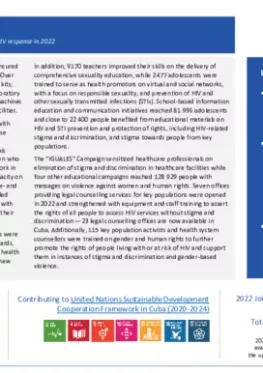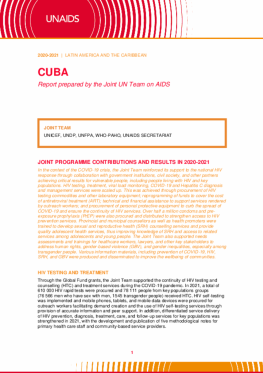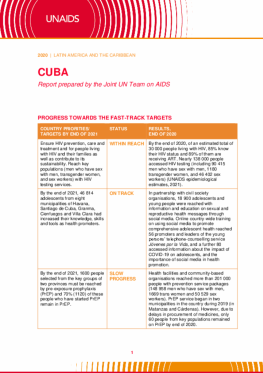Community-led HIV and sexually transmitted infections prevention programmes reached over 967 000 adolescents, thanks to the Joint Programme’s collaboration with several networks, namely: RedCub+, Red HSH, Red TransCuba and Red de Mujeres Positivas. Over 9100 teachers have improved capacities to incorporate HIV prevention in the education system while 4670 adolescents were trained to promote and strengthen health education programmes in schools and communities. Engagement with 1154 adolescents and young people, including transgender girls, gay men and other men who have sex with men, and young people living with HIV or disabilities, helped to identify their HIV and sexual and reproductive health needs, that informed the development of out-of-school comprehensive sexuality education programmes. In addition, close to 22 400 people, including key populations, community leaders, health personnel and managers also benefited from educational materials on the prevention of HIV and sexually transmitted infections and protection of rights (UNFPA).
Comprehensive adolescent health services in 20 municipalities were enhanced through the implementation of a new policy and quality standards with a focus on sexual and reproductive health, as well as the orientation of nearly 650 healthcare professionals on appropriate application of these standards and policy. Moreover, 55 primary health care units and 1618 basic health teams gained further expertise in delivering comprehensive care and health information among adolescents, including counselling on contraception and sexually transmitted infections screening, thanks to the support from the Joint Programme (UNFPA).
To further reinforce testing and monitoring of people living with HIV, GenXpert machines for HIV viral load monitoring were installed in each of the six primary healthcare facilities and five molecular biology laboratories obtained laboratory equipment and supplies (UNDP). In addition, in partnership with the networks RedCub+, Red TransCuba, Red HSH and Federación de Mujeres Cubanas (FMC), nine community brigades established in Pinar del Río and Artemisa municipalities ensured the continuity of HIV and other healthcare services among 7425 people affected by Hurricane Ian—including women and transgender people living with HIV and people diagnosed with other sexually transmitted infections (UNFPA).
Community-led HIV response for key populations was reinforced through capacity building of 1776 gay men and other men who have sex with men, transgender women and people living with HIV working in community spaces. Besides, a total of 435 people living with HIV were trained as adherence managers to increase treatment adherence among their peers (UNDP). Key populations organizations—TransCuba, RedCub+ and HSH-Cuba are better equipped to deliver quality HIV prevention, testing and support services through technical and material support such as education materials and communication devices. The Joint Programme also provided strategic support to 23 legal guidance services, where 244 people including women, gay men and other men who have sex with men, and men living with HIV sought support in 2023 (UNDP).




